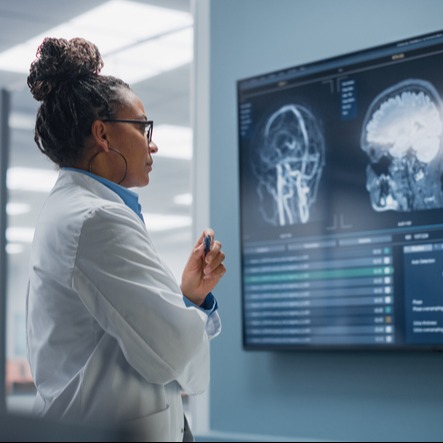
In December 2023, Google launched MedLM, a division focused on generating artificial intelligence (AI)-based solutions for the healthcare industry. The goal was to leverage Google’s substantial success in curating large datasets to provide tailored answers to user-generated questions.
MedLM was not Google’s first foray into AI diagnostics. In 2008, Google Flu Trends went live, providing almost real-time tracking of annual influenza outbreaks based on user’s search terms (e.g., “cough and fever”). The project was terminated in 2013 after missing that year’s flu peak by a substantial margin. Nevertheless, Google continued refining its models and improving its results. In March 2024, Google announced several initiatives in women’s health.
Key Takeaways
AI improves access to emergency obstetric care by analyzing travel times and local barriers.
AI simplifies prenatal ultrasound use, expanding access to pregnancy monitoring globally.
AI enhances breast cancer detection through advanced analysis of imaging data and biomarkers.
Google's AI diagnostics advance women's health by detecting diseases early and improving healthcare access globally.
AI Solutions for Emergency Obstetric Care
Every two minutes, a woman dies from complications related to childbirth somewhere in the world, with the majority of these deaths being preventable. Approximately 70% of these fatalities occur in Sub-Saharan Africa. A critical factor contributing to these tragedies is the considerable distance many women must travel to access hospital care while in labor. This journey, fraught with risks, becomes especially perilous in the event of complications.
Google is using AI to improve maps that indicate where pregnant women can access necessary care. In Nigeria, Google teamed up with the OnTime Consortium to develop a tool that calculates travel times to the nearest hospitals or clinics offering emergency obstetric services. This tool assists decision-makers in places like Benin City in identifying areas where pregnant women face difficulties reaching these facilities. Research assistants can then visit these communities to understand the barriers to accessing care, which often include poor road conditions or a lack of trained medical personnel nearby.
By combining data with on-the-ground insights, Google is developing innovative, practical solutions to improve access to emergency obstetric care. They are now expanding this approach to other regions beyond Nigeria, aiming to help more women worldwide have safer pregnancies and childbirth experiences.
AI and Prenatal Ultrasound
Ultrasound functions similarly to a camera, allowing medical professionals to monitor babies growing inside their mothers. It is crucial for ensuring the health and well-being of both the mother and the developing fetus. However, a significant challenge persists: many regions around the world lack sufficient personnel trained to operate ultrasound equipment.
To address this issue, Google has been leveraging AI to simplify the use of ultrasound machines for doctors and nurses who are not specialists in this technology. This innovation means that more locations globally could gain access to this essential diagnostic tool.
In 2023, Google teams from America and Africa collaborated with Jacaranda Health in Kenya to implement this solution. Google researchers visited several birthing centers to pilot their new AI system. Since January 2024, numerous pregnant women have participated in the Google project, potentially transforming prenatal care accessibility.
AI for Breast Cancer Detection
Today, breast cancer is the most common type of cancer worldwide. Early detection is crucial, and mammograms are the standard screening method. However, they have limitations—they are costly and less effective for individuals with dense breast tissue. Ultrasound, often used in conjunction with mammograms, could serve as an excellent primary detection tool.
Google has partnered with Chang Gung Memorial Hospital in Taiwan to explore how their AI technology might aid in the early detection of breast cancer using ultrasound. In 2023, Google initiated a study to analyze volunteers' ultrasound images, mammograms, and other health indicators. The goal is to develop AI models that can effectively screen for breast cancer using ultrasound. The preliminary results have been promising.
Our efforts are part of a broader initiative to enhance women’s health, which includes the U.S. government's recent emphasis on women’s health research. With increased attention and resources, we anticipate significant advancements in women’s health globally in 2024.
AI and Women’s Health
Google’s AI diagnostics programs have the potential to significantly improve outcomes for diseases that disproportionately affect women. By harnessing cutting-edge AI technology, Google aims to revolutionize the detection, diagnosis, and treatment of these diseases.
A prime focus of Google’s AI diagnostics is the early detection of breast cancer, the most common cancer among women globally. Early detection is essential for effective treatment and improved survival rates. Traditional screening methods like mammograms, however, face challenges such as cost barriers and decreased effectiveness in specific demographics. Google’s AI algorithms, by analyzing extensive imaging data and biomarkers, could potentially detect early signs of breast cancer, facilitating timely interventions and better outcomes.
Google’s initiatives extend beyond breast cancer to include a broader spectrum of diseases that impact women, such as cervical cancer, ovarian cancer, and cardiovascular diseases. For instance, cervical cancer screenings typically rely on Pap smears, which may be less accessible or effective in certain populations. Google’s AI can enhance the analysis of cervical screening results, improving the detection of abnormalities and thereby enabling early treatment. This could significantly reduce the incidence of cervical cancer among women. Through these innovative approaches, Google’s AI diagnostics programs are set to make a profound impact on women’s health worldwide.
In addition to cancer detection, Google’s AI diagnostics programs show promise in enhancing outcomes across other areas of women’s health. For instance, AI-powered predictive models can help identify women at higher risk of developing conditions such as preeclampsia during pregnancy or osteoporosis later in life. By proactively identifying individuals at risk, healthcare providers can implement preventive measures and personalized treatment plans, mitigating the impact of these diseases on women’s health.
Furthermore, Google’s AI diagnostics programs have the potential to improve healthcare access and equity for women worldwide. By developing scalable and cost-effective diagnostic solutions, Google can help overcome barriers to healthcare access, especially in underserved communities where women may face socioeconomic challenges or geographical barriers to obtaining healthcare services.
Overall, Google’s AI diagnostics programs represent a transformative approach to improving outcomes for diseases affecting women. Through innovation, collaboration, and a commitment to advancing women’s health, Google is poised to make significant strides in combating diseases that disproportionately impact women, ultimately leading to better health outcomes and an improved quality of life for women globally.
Rely on PlanetDrugsDirect.com to Buy Prescription Discount Drugs Online
As a trusted prescription referral service, we offer important benefits whenever you order online. Each of our partner pharmacies and/or government-approved dispensaries is committed to providing the best experience possible of any online prescription referral service on the internet. We offer:
Low prices
Quick turn-around times
Generic and brand-name medications
Unparalleled customer service
Sources
Brandão, M., Mendes, F., Martins, M., Cardoso, P., Macedo, G., Mascarenhas, T., & Mascarenhas Saraiva, M. (2024). Revolutionizing Women's Health: A Comprehensive Review of Artificial Intelligence Advancements in Gynecology. Journal of Clinical Medicine, 13(4), 1061. https://doi.org/10.3390/jcm13041061
American College of Nurse-Midwives. (2023). The state of midwifery and maternal care in rural America. Journal of Obstetric, Gynecologic & Neonatal Nursing, 52(1), Article S0884-2175(23)00029-1. https://www.jognn.org/article/S0884-2175(23)00029-1/fulltext
Monegain, B. (2023). Google launches generative artificial intelligence models for healthcare. HealthITAnalytics. https://healthitanalytics.com/news/google-launches-generative-artificial-intelligence-models-for-healthcare
Lumsden, M. A., & Davies, S. R. (2019). Menopause and cardiovascular disease in women. Climacteric, 22(6), 540-546. https://www.tandfonline.com/doi/full/10.1080/13697137.2019.1682804
Google AI Blog. (2020). How AI is helping advance women's health around the world. Google Blog. https://blog.google/technology/health/how-ai-is-helping-advance-womens-health-around-the-world/
Data Collaboratives. (2008). Google Flu Trends. https://datacollaboratives.org/cases/google-flu-trends.html
On Time Consortium. (n.d.). About us. On Time Consortium. https://www.ontimeconsortium.org/
 Medically reviewed by
Medically reviewed by 





